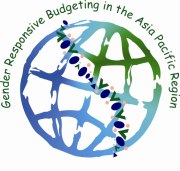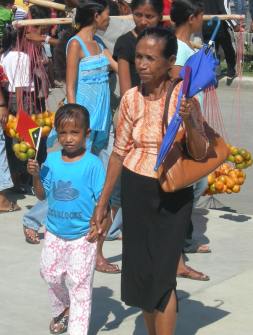 About the project
About the project
Gender-Responsive Budgeting in the Asia-Pacific Region is a research project located at the Hawke Research Institute and the Research Centre for Gender Studies, University of South Australia. The project involves a collaboration between Rhonda Sharp (University of South Australia), Diane Elson (University of Essex) and Siobhan Austen (Curtin University of Technology).
What is our purpose?
Gender-responsive budgeting has caught the attention of activists, gender researchers, policy makers and the development community across the globe and has become an integral part of efforts to advance gender equality. The challenge is how to devise and implement sustainable gender budgeting with objectives consistent with a country's circumstances.
 Despite being 'invented' in Australia in the mid 1980s, and increasingly taken up in a variety of ways by Asia-Pacific governments and civil society groups, there is little published research on the region's gender-responsive budgeting initiatives and limited understanding of their possibilities. Major aid programs in the region have been relatively slower than elsewhere in the world to use gender-responsive budgeting approaches to promote women's economic empowerment.
Despite being 'invented' in Australia in the mid 1980s, and increasingly taken up in a variety of ways by Asia-Pacific governments and civil society groups, there is little published research on the region's gender-responsive budgeting initiatives and limited understanding of their possibilities. Major aid programs in the region have been relatively slower than elsewhere in the world to use gender-responsive budgeting approaches to promote women's economic empowerment.
This project seeks to fill a gap in existing knowledge by examining the practices of, and potential for, integrating a gender perspective into budgetary processes in the Asia-Pacific region. The research aims to inform stakeholders in the development process how public expenditure and revenue raising can contribute to equality between men and women and to women's economic empowerment. It also seeks to generate resources that are specific to the region that can be used by governments, civil society, researchers and policymakers.
For more resources on gender-responsive budgeting see UNIFEM's Gender-Responsive Budgeting site.
What is our approach?
This project uses quantitative and qualitative data to undertake:
- a review of the evidence of the gender-responsive budget practices of several countries in the Asia-Pacific region. (See Country profiles)
- a case study of the practices and potential of the Indonesian national gender budget initiative. (See Country profiles, Publications, and Media and team updates)
- a counterpoint case study of Timor Leste focusing on the enabling and constraining factors for introducing gender-responsive budgeting. The potential for gender-responsive budgeting to promote women's economic empowerment is explored with an analysis of the education sector drawing on the Timor Leste Living Standards Surveys. (See Country profiles, Publications, and Media and team updates).
Funding
This two-year research project was initially funded by an Australian Development Research Award, a national competitive grant scheme financed by the Australian Agency for International Development (AusAID), from 2008 to 2010.


